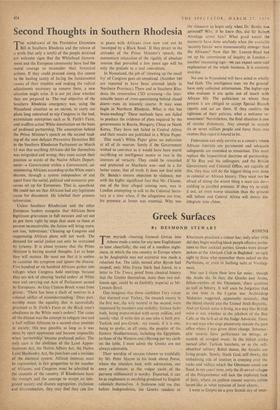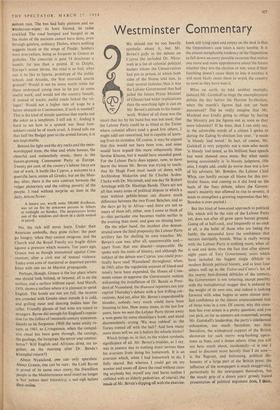Greek Surfaces
By DESMOND STEWART ATHENS OT1 HE myriads cheering General Grivas into I Athens made a noise for any sane Englishman to hear cheerfully; the end of a needless night- mare, in which the one country in Europe where to be Anglophile was not eccentric was made a reluctant foe. The cafés named after Byron had moped; only Miss Freya Stark had found, in a letter to The Times, proof from classical history that the Greeks themselves, more than two mil- lennia ago, could be as foolishly imperial as Mr. Lennox-Boyd.
One imagines that those confident Tory voices that warmed over Turkey, the staunch enemy in the first war, the wily neutral in the second, were impressed by numbers and stolidity. Greece lacks both, being overcrowded with seven million, and noisily vital. (I write this as one who is both pro- Turkish and pro-Greek: my mania, if it is one, being to prefer, at all costs, the peoples of the Eastern Mediterranean, including the Egyptians, to those of the Western end.) Having put my cards on the table, I must admit the Greeks are not always admirable.
Their worship of success (shown so truthfully by Mr. Peter Mayne in his book about Poros, where the islanders look with admiration, not envy or distaste, at the vulgar yacht , of the parvenu millionaire) is tawdry. Exported, it can be as unpleasant as anything produced by English colonials themselves. A Sudanese told me that before Independence, the Greeks resident in Khartoum practised a colour bar; only after 1956 did they begin sending black people effusive invita- tions to their cocktail parties. Greeks wore dinner jackets at the Alwiyah Club in Baghdad : an ugly sight to those who remember them naked on the Parthenon, or even in bathing suits at Vouliag- men i.
Nor can 1 share their love for noise : though the Arabs do. In fact, the Greeks and Arabs, fellow-victims of the Ottomans, share qualities as well as history. It will soon be .forgotten that at one time in the Cyprus war Archbishop Makarios suggested, apparently seriously, that the island should join the United Arab Republic. And yet Greek noise is living, in a way that British noise is not, whether in the jukebox of the Bay Cafe, or the hi-fi set of the Judge Advocate. There is a sad man who sings plaintively outside the post office where 1 was given short change. Innumer- able taverns have performers on strings, or records of stringed music. In the linked debka named after Turkish butchers, or in the self- absorbed solitary Rebel dance, the Greeks are living people. Slowly, thank God, still slowly, the embalming tide of tourism is creeping over the rocks and valleys which the Ottomans could not flood. In ten years' time, only the ill-served villages of the Peloponnesus will lack the exploited look of Italy, where six million annual tourists nibble locust-like at what remains of local charm.
I went to Delphi on a grey Scotch day of inter- mittent rain. The bus had holy pictures and no windscreen-wiper; its horn blasted, its radio crackled. The road bumped and banged us as the mules of the ancients cannot have done, even through gateless, ordinary Thebes, where nothing suggests incest or the songs of Pindar. Soldiers were everywhere, being as frequent in Greece as potholes. The conscript is paid 54 drachmas a month, far less than a pound. If to Delphi, Europe's senior Shrine, the road is so bad, what can it be like to Sparta, prototype of the public school, and Arcadia, the first oversold tourist ground? Would it not be more worth while for these underpaid young men to be put to some useful work, and would not the country benefit, if instead of tracks, useful roads linked the vil- lages? Would not a higher rate of wage be a better obstacle to Communism, if such is wanted? This is the kind of simple question that marks out the asker as a simpleton. I still ask it : finding it hard to see how in a sputnik war these foot- soldiers could be of much avail. A friend tells me that half the Budget goes to the armed forces; it is not improbable.
Behind the light and the dry rocks and the once- worshipped trees, the blue and white houses, the cheerful and melancholy music, there is the fastest-growing Communist Party in Europe. Twenty per cent. of the country's labour force are out of work. A battle like Cyprus, a welcome to a guerrilla hero, unites all Greeks; but on the Mon- day after, there is the sore contrast between the vulgar plutocracy and the rotting poverty of the people. I read without surprise an item in the daily Athens News: A luxury car, worth some 500,000 drachmas, was set on fire by unknown persons in Athens at midnight on Sunday. The perpetrators broke one of the windows and threw in a cloth soaked in petrol.
No, the rich will never learn. Under their American umbrella, they grow richer; the poor go hungry, when they cannot emigrate, and the Church and the Royal Family are fragile dykes against a pressure which mounts. Ten years ago, Greece was as though immunised against Com- munism, after a civil war of mutual violence. Today even sons of murdered or deported parents listen with one ear to Marxist propaganda.
Perhaps, though, Greece is the last place where one should look behind, or beyond; all is on the surface, and a surface without equal. And March, 1959, shows a surface where it is pleasant to speak English. The hotels are not yet full, the taverns are crowded with Greeks since outside it is cold, and grilling meat and dancing bodies heat the cellar. Friendly glasses of bad wine are raised to strangers. Byron did enough for England's reputa- tion for the follies of twentieth-century statesmen- dwarfs-to be forgotten. (Will the same amity re- turn. in 1965, to Livingstonia, when the compul- sive ritual has been gone through, the canings, the gaolings, the hangings, the terror and counter- terror? Will English and Africans drink tea to- gether, on the morning after Dr. Banda's triumphal return?) About Nyasaland, one can only speculate. About Greece, one can be sure : the Café Byron is proud of its name once more; the friendliest people in the Mediterranean need insert no longer a 'but' before their friendship, a sad sigh before their smiles.







































 Previous page
Previous page